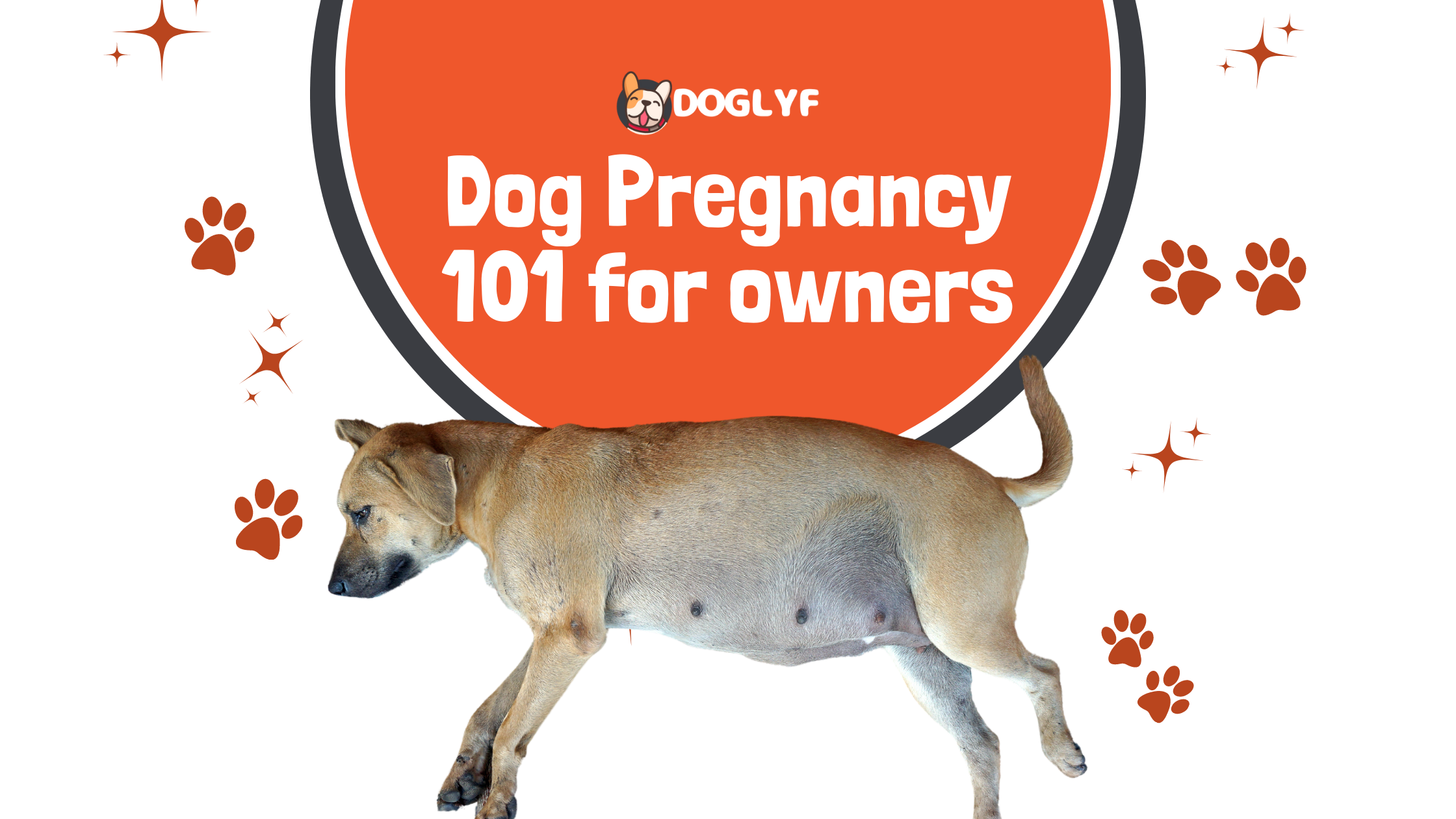This post may contain affiliate links. For more information about my affiliate disclosure, please click here
Dog’s Pregnancy is a complex and fascinating process. It can be both exciting and nerve-wracking for pet owners as they eagerly await the arrival of their new four-legged family member.
As such, it’s essential to understand how long your pup will carry her litter before giving birth. In this article, we’ll explore the length of canine gestation periods, its associated risks, and steps you can take to ensure that the pregnancy goes smoothly.
For many pet parents, an accurate timeline is critical when planning their dog’s upcoming litter. On average, a pregnant doggo’s term lasts around 63 days – but several factors could extend or shorten this time frame.
From breed size to environmental stressors, each element affects the length of gestation differently – making it impossible to give an exact number without considering all related variables.
In addition to understanding what influences the duration of canine pregnancies, it’s essential to know about the potential health issues that may arise during gestation.
Knowing these symptoms beforehand can help prepare you should any complications develop during the delivery season – allowing you and your vet to make informed decisions if necessary. So let’s dive into everything you need to know about ‘how long dogs are pregnant’!
Check out our Dog’s Brain Training Program Here.
Table of Contents
Gestation Periods
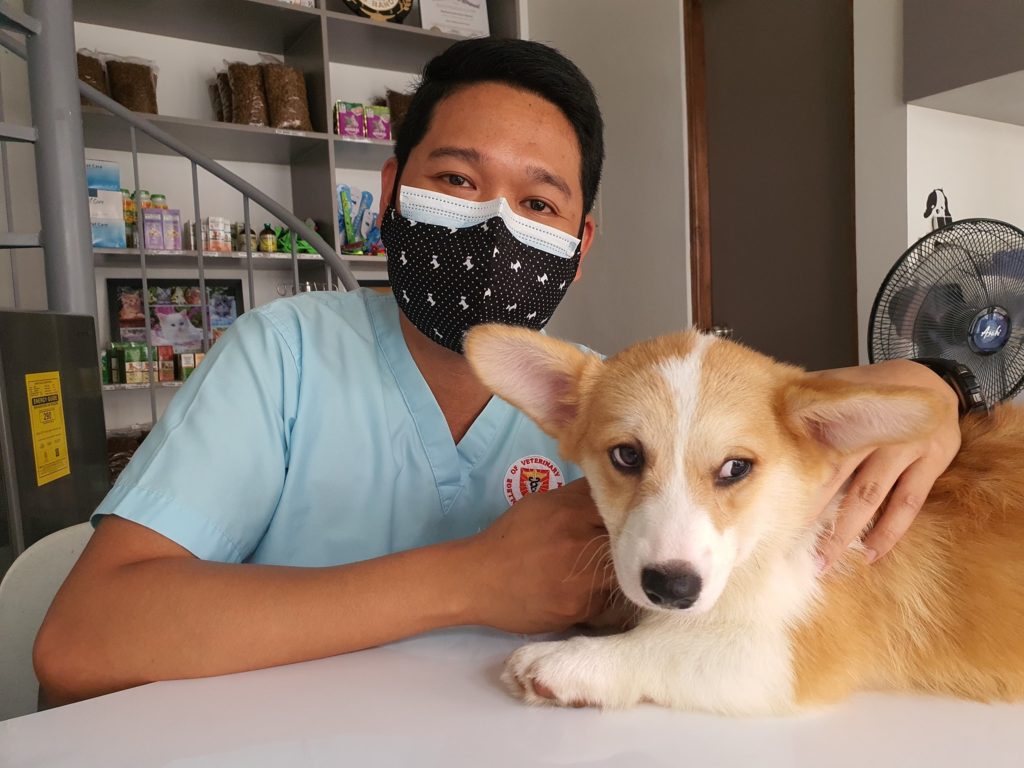
Canine gestation periods vary in length, but most dogs are pregnant for an average of 63 days from conception to delivery. This pregnancy length can range anywhere from 58-68 days, depending on the breed and size of the dog.
The gestation period begins when a female dog is bred and ends with the birth of her puppies. During this time, it’s essential to keep track of any changes in your pup’s behaviour or appetite that may be signs of puppy gestation.
Knowing how long your canine friend will be pregnant helps you prepare for labour and delivery and plan for necessary supplies like food, bedding, and toys!
As the due date draws closer, familiarizing yourself with typical signs of pregnancy can help you recognize if your pet needs additional care or attention during this particular time.
Signs Of Pregnancy

Pregnancy in dogs can be a tricky thing to diagnose. However, by paying close attention to their behaviour and physical changes, you may be able to spot some of the common signs of pregnancy in your pup.
The most noticeable symptom is a change in maternal behaviour, such as more affection from the mother towards her puppies-to-be or even other animals and people she interacts with.
Physical manifestations of pregnancy include weight gain, especially around the abdomen, and an increased appetite for food. Mood swings are also commonly seen amongst pregnant dogs; this typically involves bouts of depression or aggression accompanied by restlessness during nesting activities like rearranging beds and toys.
These behaviours can be quite subtle initially but should become more evident over time.
In addition to these symptoms, your dog may display altered eating habits throughout her pregnancy – sometimes refusing certain foods or becoming increasingly picky about what she will eat.
As the due date approaches and labour begins, it’s important to monitor your pup closely so that if any complications arise, they can be addressed quickly by a veterinarian. By recognizing the signs early on, you’re helping ensure both mom and puppy have a safe delivery!
Diagnosis Of Pregnancy
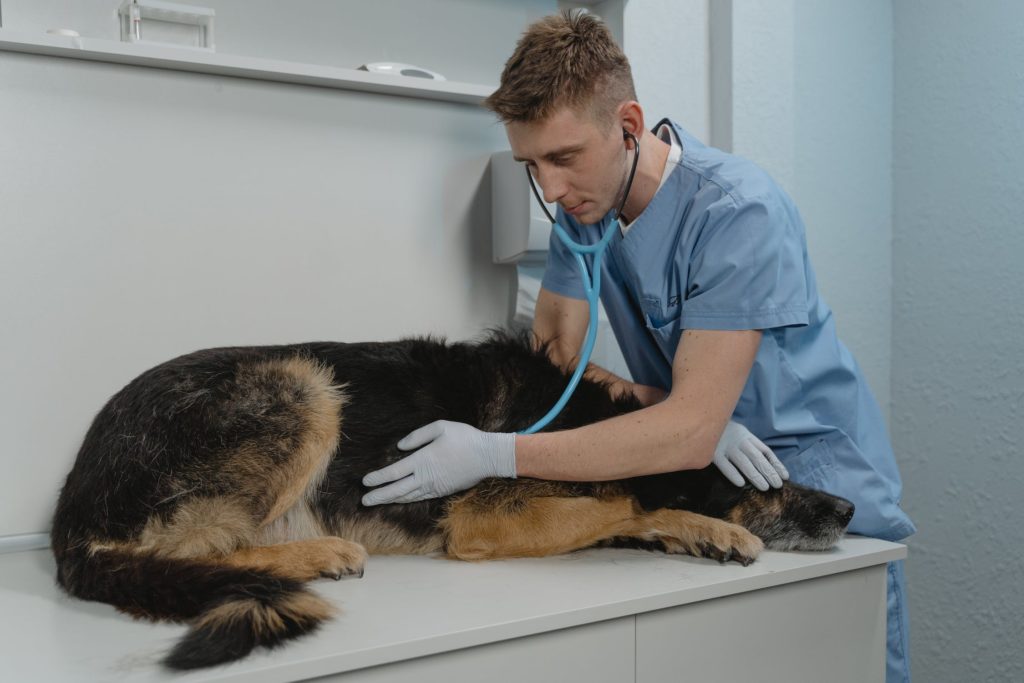
Once signs of pregnancy have been identified, it is important to confirm the diagnosis. The most common way of diagnosing a pregnant dog is through an ultrasound or radiograph.
Ultrasounds can detect puppies as early as day 25 and provide more accurate measurements than radiographs.
Radiography can be used in the later stages of gestation (after 40 days) to count how many puppies are present. Pregnancy tests for dogs also exist, but they do not always give reliable results.
Blood tests can be useful in determining hormone levels associated with pregnancy such as progesterone, relaxin, and estradiol-17β.
All increase during different stages of canine pregnancies; however, these tests should only be performed by a veterinarian with experience interpreting them correctly.
Finally, it’s important to remember that even if all diagnostic tools are utilized, there is still no guarantee that one will accurately determine if a dog is pregnant.
Therefore, owners must remain patient and continue monitoring their pet’s health throughout the course of her pregnancy to ensure she remains healthy and happy until the delivery time arrives. With this knowledge in hand, owners will now turn their attention towards dietary considerations for expectant mothers.
Dietary Considerations For Expectant Mothers

Pregnant dogs require special dietary considerations to ensure a healthy pregnancy. Proper nutrition is essential for maintaining the health of both mother and pup.
When it comes to canine pregnancy nutrition, extra care should be taken with an expectant mother’s food intake. A gestating canine diet should include high-quality proteins and plenty of vitamins and minerals.
Additionally, pregnant canines need more fatty acids, such as omega-3s, that help support their growing pups’ development.
It’s also important to provide enough calories while monitoring weight gain throughout the pregnancy. Many formulas are specifically designed for pregnant canines, so consult your veterinarian when creating a meal plan for your pet.
To ensure she gets all the nutrients she needs during this important time in her life, supplementing with calcium and phosphorus may be necessary, depending on her diet choices.
Finally, fluids are just as essential in keeping an expectant mom hydrated throughout her pregnancy journey – fresh water must always be readily available!
With proper nutritional planning and regular visits to the vet, you’ll have peace of mind knowing that you and your four-legged family member are receiving optimal care during these precious months together.
Moving forward, let us look at the various stages of canine pregnancy…
Stages Of Canine Pregnancy
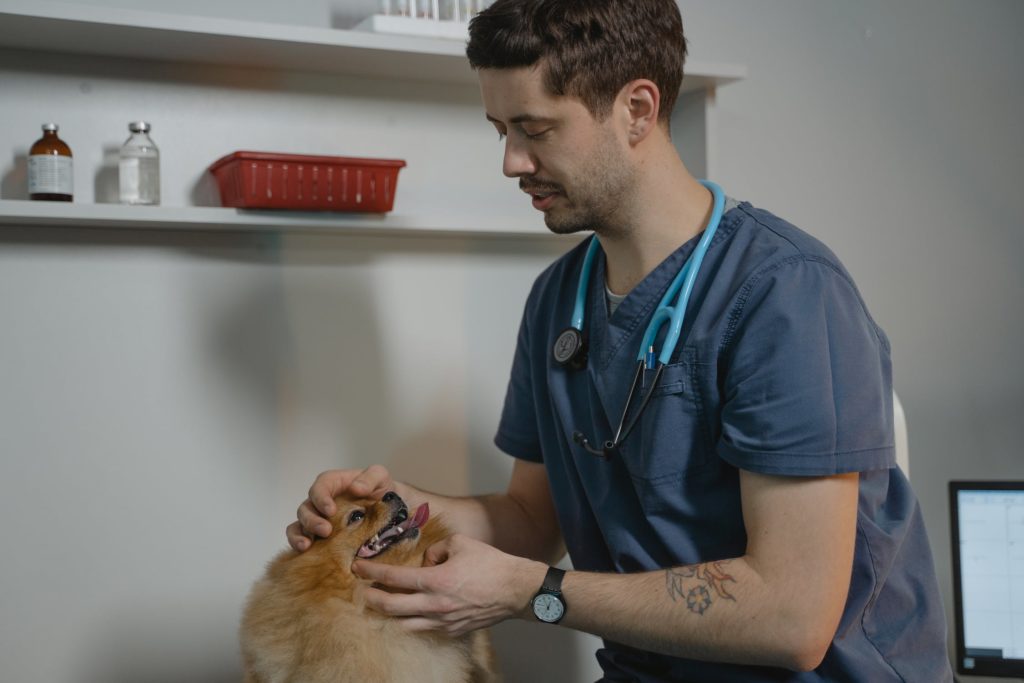
Canine pregnancy is a fascinating time for pet parents and their pups. There are several stages of canine pregnancy, that each have different needs to ensure a healthy litter.
The canine pregnancy timeline typically lasts between 58-68 days, depending on the breed. During this period, it’s essential to monitor your dog closely and provide her with ample rest, nutrition and care.
The first stage of canine pregnancy begins at conception and lasts until day 17 or 18. At this point, you should take your dog in for an ultrasound so that your vet can verify the number of puppies present in the uterus.
As the embryos continue developing during these early weeks, they will require additional energy from their mother and vital nutrients like calcium and protein.
The second stage of canine pregnancy occurs during weeks four through six. This is when physical changes become apparent as your pup’s abdomen expands due to the growth of the fetus inside her womb.
Your veterinarian may also recommend blood tests to check for potential issues, such as low platelet count or eclampsia (a condition caused by high calcium levels). It’s essential to closely monitor your dog’s diet during this stage since she’ll need extra calories to support her growing babies.
- By the seventh week of canine pregnancy, most breeds will begin producing milk in preparation for delivery, usually around week nine or ten.
You’ll want to start preparing a whelping box where she can give birth safely away from other pets and children who might be too curious about what’s happening!
Now more than ever, your pup needs quality nutrition, tender love, and care throughout her journey into motherhood.
Your furry friend has come quite far already – now let us discuss how best to care for her during this particular time…
Care During Pregnancy
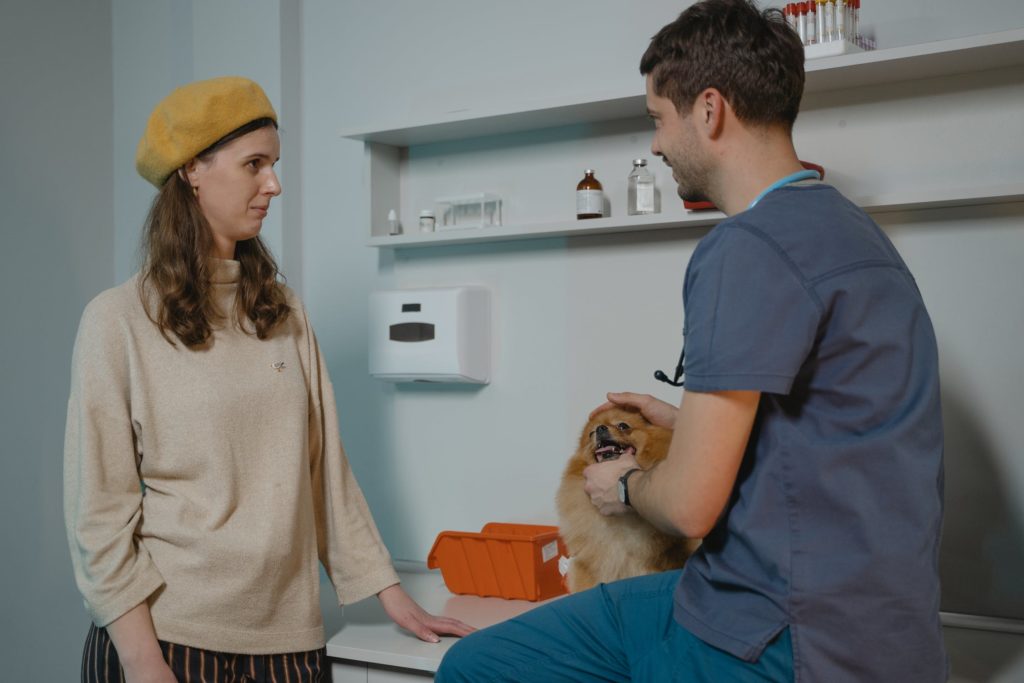
Caring for a pregnant dog is an important part of the pregnancy process. Providing proper nutrition and guidance during this special time helps ensure that your pup has a healthy gestation period and can successfully deliver its puppies.
A pregnant dog must follow a balanced diet, including extra nutrients such as proteins, fats, carbohydrates and vitamins. With the help of your veterinarian’s advice, you should create a puppy care guide explicitly tailored to meet the nutritional needs of your pooch throughout her pregnancy.
It’s also essential to provide plenty of exercise for your pet, but avoid activities that could cause harm or put too much strain on her body. Monitor her activity level closely and adjust it according to how she feels daily.
You may also need to adjust your house rules – giving more frequent access outside so she can relieve herself regularly, providing warm blankets or beds in colder temperatures, and keeping the calm music playing. At the same time, she rests are some examples that will help keep her comfortable during this stage.
Lastly, regular visits with the vet are necessary throughout the pregnancy; they’ll be able to monitor both mommy’s health and fetal development.
With attentive care from you and medical attention from professionals, you can give your mama canine all she needs to have a safe delivery when the time comes!
Taking these steps now will set you up well down the road; taking good care of the mother, nature takes care of itself!
Preparing For Birth
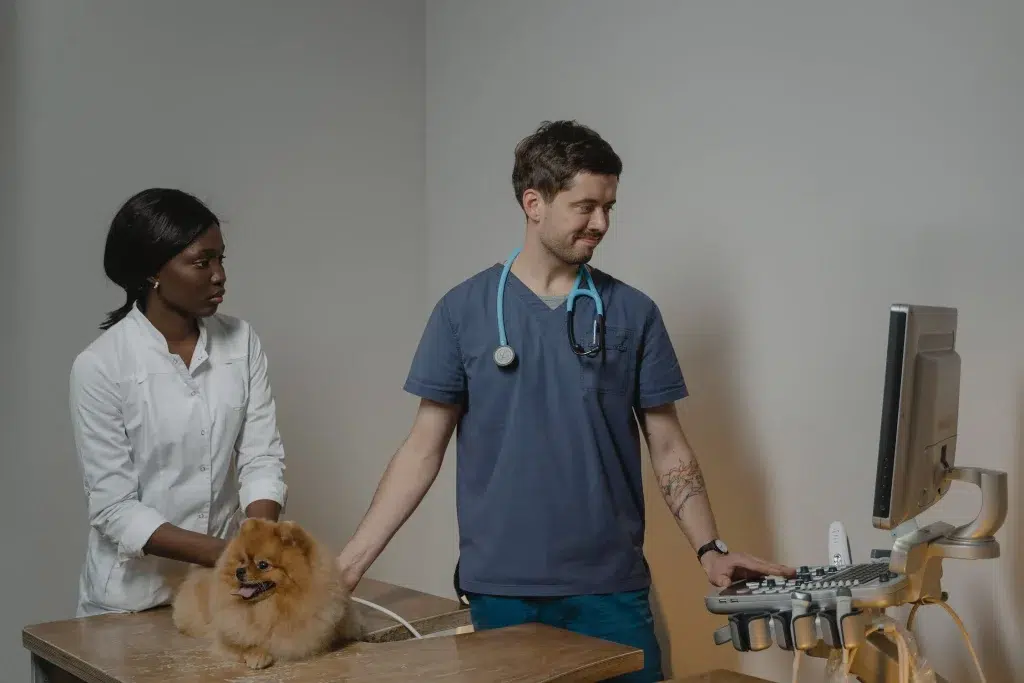
Once a female dog has been confirmed pregnant, it is essential to begin preparing for the birthing process.
To help ensure any potential issues are identified during pregnancy, veterinarians recommend scheduling prenatal exams throughout the gestation period.
These appointments also allow you to discuss whelping supplies and puppy delivery options with your veterinarian.
- It’s best to start gathering all necessary materials before the puppies arrive; this will give owners time to organize their birthing kits and familiarize themselves with adequately caring for newborns.
Owners should consider purchasing nesting items such as blankets, towels, or even old shirts that can be used in the whelping box after birth.
Additionally, a thermometer is critical when monitoring mother and pup temperatures during labour and postpartum stages.
Finally, observing the mom-to-be before delivery can also offer clues on when she may go into labour – signs like panting heavily or displaying nesting behaviour often indicate impending birth.
All these preparations ensure owners have everything they need ahead of time, so they’re prepared whenever their little ones come!
Common Complications During Pregnancy

Pregnancy in dogs can present many complications, so it’s important to monitor the health of your canine closely.
The most common complication during pregnancy is canine eclampsia, a condition due to low levels of calcium and phosphorus in the mother’s body. It can lead to seizures and even death if left untreated.
Puppy resorption, where their mothers’ bodies reabsorb puppies, is another possible complication. Placental abruption is an uncommon but serious issue; it involves the placenta prematurely separating from the uterus wall before birth.
Premature birth may also occur due to false gestation or infection.
Pet parents must be aware of these potential dangers before mating to ensure their dog receives appropriate care throughout her pregnancy.
Regular appointments with your veterinarian will increase the chances of detecting any problems early on and getting them treated instantly.
With proper monitoring and care, you can help keep your pup safe through this exciting time! Transitioning into Delivery and Aftercare requires watching mum-to-be’s progress every step of the way – literally!
Delivery And Aftercare

Canine pregnancy typically ranges from 58 to 68 days. During the last few weeks of gestation, it is vital that expecting mothers receive optimal nutrition and care so they to have a safe delivery process.
When the time has come for puppies to be born, the mother will usually look for an area with minimal movement or noise where she can feel secure as she begins her labour.
Providing an environment such as a whelping box may be beneficial so that the mother can relax and give birth safely. Delivering puppies is often a long but manageable process if monitored closely by their owners.
- Puppies are usually born head-first, and the rest of their bodies soon follow suit – however, veterinary assistance should still be sought in case of complications during birthing.
Once all puppies have been delivered successfully, they must still receive adequate aftercare. Ideally, this includes keeping newborns warm and nourished by providing colostrum milk until solid food becomes available.
Additionally, puppy vaccinations should occur as soon as possible because these immunizations help protect against potentially deadly diseases like parvovirus or distemper virus. With proper postpartum care, new puppy parents can ensure their furry friends get off on the right paw!
Postpartum Care
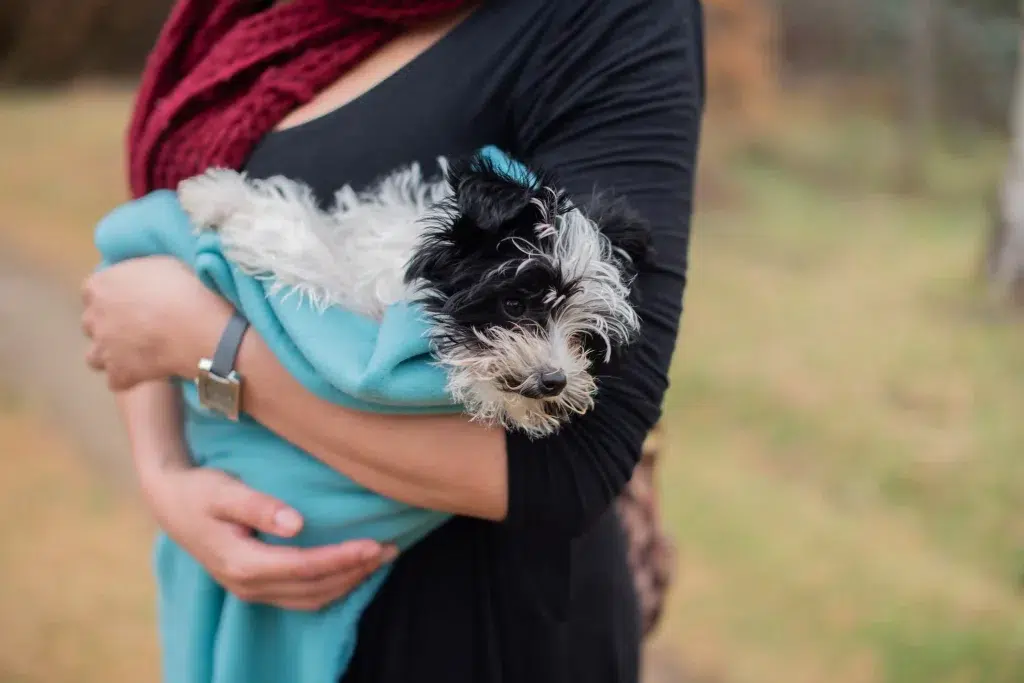
Postpartum care is essential for a female dog’s health after giving birth. It’s important to monitor her closely and provide any necessary treatment or support during recovery.
This includes providing the mother access to clean water, nutritious food, and comfortable bedding in a quiet area that doesn’t have too many distractions.
- It’s also wise to check on the puppies frequently and ensure they are nursing properly by their mom.
- If there are any issues, such as an inability to nurse or other medical concerns, it’s best to seek professional help immediately.
- A veterinarian should also give the mama regular examinations throughout this time.
Finally, keeping a close eye on the new mother during postpartum pays off. By doing so, you can ensure she is getting back into shape quickly and safely; plus, observe for signs of infection or illness before things get out of hand.
With proper monitoring and care from a responsible owner, your canine companion will enjoy more years of good health ahead!
Frequently Asked Questions
How Can I Tell If My Dog Is Pregnant?
Figuring out if your dog is pregnant can be a difficult task. However, knowing the telltale signs of pregnancy in dogs can make it easier to determine if they are expecting puppies.
Many indicators can help you decide if your pup is carrying a litter, from physical signs to mating signals and body changes.
The first step in determining whether or not your pet is pregnant includes noting any obvious mating signs.
Has your dog been exposed to an unaltered male recently? If so, then this could point toward them being pregnant.
Additionally, look for any behavioral changes such as increased appetite or nesting behavior which may indicate that they are expecting puppies soon.
Physical symptoms of canine pregnancy include weight gain, enlarged nipples and mammary glands, as well as abdominal distention due to fetal growth and overall body changes.
Your vet will likely also want to check for uterine enlargement by doing a hands-on exam at some point during gestation. With all these things taken into consideration, it should be much easier to ascertain whether or not your pooch is ready for motherhood!
If you believe your dog might be pregnant but just aren’t sure, don’t hesitate to consult with their veterinarian about scheduling an exam; this is the best way to get definitive answers regarding their condition.
That said, keep an eye out for other warning signs and pay attention to possible physical cues that suggest she’s expecting – because one thing’s certain: when it comes time for delivery day, you’ll want plenty of notice!
What Is The Average Length Of Time Between Conception And Birth In Dogs?
When it comes to canine pregnancy, one of the most important questions is: what is the average length of time between conception and birth in dogs? As a veterinary writer, this question deserves an answer.
Typically, when discussing the process of conception and gestation in canines, two main points stand out.
The first is how long does it take for puppies to be born after being conceived – the average length of gestation for dogs is 63 days from conception to birth.
This means that if you know your dog has been impregnated, you should expect her litter to arrive within 8-9 weeks from the breeding date.
The second point worth noting is that although 63 days is considered an ‘average’ amount of time for a dog’s gestation period, individual breeds vary significantly in their expected gestational length.
For example, large breed dogs tend to have longer pregnancies than smaller breeds – thus requiring more patience on behalf of owners waiting for the arrival of their new pups!
It’s also important to note that even amongst other members of the same breed, variations may occur as well; some litters may take slightly longer or shorter periods of time before they are ready to meet their families.
Having said all this, understanding canine pregnancy and its associated timeline allows pet parents greater insight into caring for their pets during this special stage in life.
With knowledge comes power; now having access to information regarding gestational lengths in different breeds ensures that pet owners can better prepare themselves with expectations while approaching motherhood with their furry friends.
How Do I Ensure My Dog Gets The Nutrition She Needs During Her Pregnancy?
When a canine is pregnant, your dog’s nutrition needs become even more important. The nutritional requirements for puppies are higher than those for adult dogs, and this is especially true during pregnancy when nutrient demands increase dramatically to fuel both mother and pup’s development.
You must ensure your dog has access to all the necessary nutrients she needs throughout her pregnancy.
The key to providing adequate nutrition for your dog during pregnancy is understanding what foods will best meet these needs. Puppy food provides an excellent source of energy because it contains higher levels of fat, protein and carbohydrates compared with standard adult diets.
Additionally, puppy food should be supplemented with vitamins and minerals specific to canines along with omega-3 fatty acids which provide numerous benefits including promoting healthy brain development in unborn pups.
Finally, make sure that your pet gets enough exercise while pregnant as regular physical activity helps keep her weight at a safe level.
Exercise also boosts circulation and oxygen supply which aids fetal growth – just don’t overdo it! By taking the time to understand your dog’s unique nutritional needs during pregnancy, you’ll give her the best chance at having a successful delivery and a litter of happy, healthy puppies.
Is It Necessary To Take My Dog To The Vet During Her Pregnancy?
While it is important to ensure your pregnant dog receives an appropriate nutrition plan, it is also necessary to consider taking her for a veterinarian visit. A vet’s prenatal care can be essential in helping you and your pet during the pregnancy process.
A pregnant dog should always receive a special kind of veterinary attention that focuses on her needs specifically throughout her pregnancy.
For example, a vet might recommend specific vaccinations or tests to identify potential problems such as parasites or gestational diabetes. This type of specialized care from a qualified vet is known as “pregnancy vet” or “pre-natal vet” visits and can help diagnose any potential risks associated with giving birth.
At these appointments, the veterinarian will typically assess the overall health of both mom and pup by performing physical examinations and diagnostic screenings, including blood work and ultrasounds if needed.
Additionally, they may provide advice about diet changes or lifestyle modifications during this time period which could have positive effects on the health of both mother and baby. Depending on the stage of development, additional tests may be recommended to check for any abnormalities before delivery day arrives.
Taking your pregnant pooch to see their trusted veterinarian ensures she gets the best possible care while providing much-needed peace of mind knowing that everything is okay – leading up to her big moment!
With regular medical checkups throughout the pregnancy process, you can rest assured that you are doing all you can to give your fur baby only the best care available during this special time in her life.
Are There Any Warning Signs Of Complications I Should Look Out For?
When it comes to canine pregnancy, vigilance is key. While pregnant dogs often go through the process without any issues, there are warning signs that pet owners should be aware of in order to spot potential complications early on.
Knowing what these early-signs are can help ensure a healthy and successful canine pregnancy.
First and foremost, keep an eye out for changes in your pup’s behavior or appetite. For example, if you notice a decrease in activity levels or refusal to eat, this could be a sign of distress and warrant further investigation by your vet.
Additionally, please pay attention to her body language as she may start showing signs of pain when urinating or defecating which could indicate a urinary tract infection or other issue.
It’s also important to look for physical symptoms such as vaginal discharge that could signify an underlying health concern like pyometra – an infection of the uterus common during canine pregnancies – or problems with the placenta from inadequate nutrition.
Keep track of how far along she is in her gestation period so that you know her stage; understanding where she is in her pregnancy will provide more detailed information about possible risks associated with each trimester.
Overall, knowing what warning signs of complications to look out for during canine pregnancies is paramount for ensuring both mother and puppies stay safe and healthy throughout their journey together.
By familiarizing yourself with the indicators mentioned above, you’ll have all the tools necessary to recognize potential issues before they become serious concerns down the line.
Conclusion
In conclusion, it’s essential to know the signs and stages of a dog’s pregnancy. Knowing how long dogs are pregnant can help you prepare for the arrival of your new puppies.
The average length of gestation in dogs is around 63 days, but it may vary from breed to breed. It’s always best to take your dog for regular checkups at the vet during her pregnancy so that any potential issues can be caught early on.
Lastly, look out for warning signs such as lack of appetite or unusual abdominal swelling which could indicate complications with her pregnancy. With proper care and monitoring, you’ll soon have some adorable furry additions to your family!
